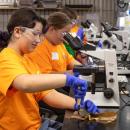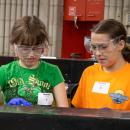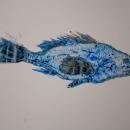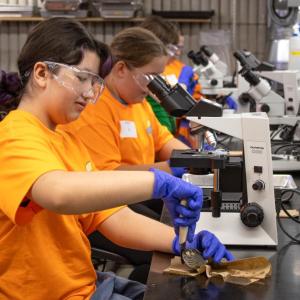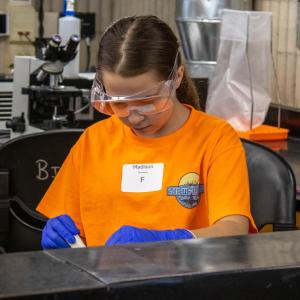Eureka! Girls become scientists for a day
 Aubrie Bellavance opens up a shellfish during UMass Dartmouth's annual STEM4Girls event on Saturday, Sept. 27. Photos by Abby Van Selous
Aubrie Bellavance opens up a shellfish during UMass Dartmouth's annual STEM4Girls event on Saturday, Sept. 27. Photos by Abby Van Selous Madison Levesque looks at a shellfish.
Madison Levesque looks at a shellfish. Paula Herrera, 12, paints a fish.
Paula Herrera, 12, paints a fish. Girls brainstorm ways to get balls back into a bucket as quick as possible.
Girls brainstorm ways to get balls back into a bucket as quick as possible. Girls watch as their designs for a renewable energy harvester is tested.
Girls watch as their designs for a renewable energy harvester is tested. Emily Giordano, left, and Madison Levesque examine a shellfish together.
Emily Giordano, left, and Madison Levesque examine a shellfish together. The print of a fish one girl created.
The print of a fish one girl created. Ali Moore presses a sheet of paper down on a fish with Paula Herrera, 12.
Ali Moore presses a sheet of paper down on a fish with Paula Herrera, 12.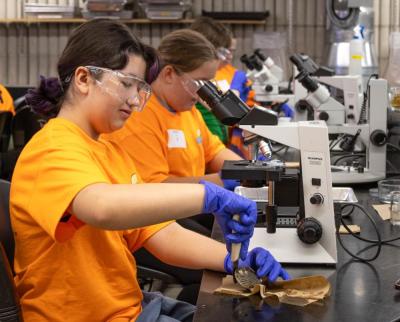 Aubrie Bellavance opens up a shellfish during UMass Dartmouth's annual STEM4Girls event on Saturday, Sept. 27. Photos by Abby Van Selous
Aubrie Bellavance opens up a shellfish during UMass Dartmouth's annual STEM4Girls event on Saturday, Sept. 27. Photos by Abby Van Selous Madison Levesque looks at a shellfish.
Madison Levesque looks at a shellfish. Paula Herrera, 12, paints a fish.
Paula Herrera, 12, paints a fish. Girls brainstorm ways to get balls back into a bucket as quick as possible.
Girls brainstorm ways to get balls back into a bucket as quick as possible. Girls watch as their designs for a renewable energy harvester is tested.
Girls watch as their designs for a renewable energy harvester is tested. Emily Giordano, left, and Madison Levesque examine a shellfish together.
Emily Giordano, left, and Madison Levesque examine a shellfish together. The print of a fish one girl created.
The print of a fish one girl created.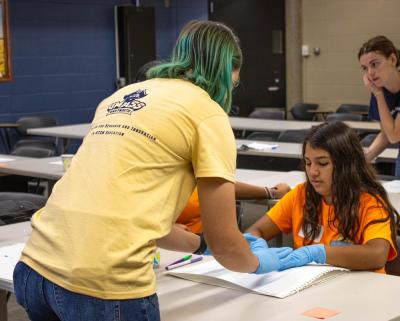 Ali Moore presses a sheet of paper down on a fish with Paula Herrera, 12.
Ali Moore presses a sheet of paper down on a fish with Paula Herrera, 12.Creating prints of fish, dissecting shellfish and designing a renewable energy harvester were just some of the hands-on experiences close to 200 girls dabbled in as part of UMass Dartmouth’s annual STEM4Girls program on Saturday, Sept. 27.
One of these girls was Amaiira Rivera, 13, of New Bedford, who signed up for STEM4Girls after it was recommended at her school. She noted that many girls from her school were attending the event.
“We signed up and then now we’re here learning about fish,” she said.
Rivera was learning about different types of fish and making prints of them with paint. She explained that different fish species have different scale patterns and some fish don’t have scales at all.
Rivera called the experience “very educational."
STEM4Girls began 13 years ago after statistics showed that less girls were interested in STEM fields. Stereotypes had also cropped up that showed that people saw math and science as subjects not meant for girls and that boys were better in these subjects.
“This started the idea that we need to invite more girls into STEM,” said Program Director Shakhnoza Kayumova.
Greenlight for girls, an international non-profit organization dedicated to inspiring girls to pursue STEM careers was founded and eventually morphed into STEM4Girls at UMass Dartmouth.
Kayumova said there’s a lot of demand for the event, noting that “the moment we open the tickets for the public, we immediately get sold out.”
Open for girls in grades three through eight, the program began with a welcome from the provost followed by a keynote speaker, a panel of current UMass Dartmouth students and 18 hands-on workshops to choose from.
Malaika Pollard, a junior and civil engineering student, first joined STEM4Girls as a volunteer last year, returning this year as one of the student panelists.
Pollard said she thinks it’s important to get people interested in STEM as early as possible because it’s “so broad and it’s so vast.”
“I think a lot of people, especially young girls, shy away from it, just because it’s scary or it’s different, and I think it’s really important for them to see people who are in STEM,” she said. “You sort of have that like, ‘I saw this person do it, I can do it’ mentality.”
Every year the program focuses on a different topic, with this year’s focus on the ocean and its relationship with the local community.
Being located on the South Coast, the ocean is “one of the central [issues]” Dartmouth and the surrounding communities face, Kayumova said.
Keynote speaker Nishita Roy-Pope, who is the CEO and founder of Courage Builder, said the message around the ocean economy was important for the girls to hear so they can “understand that they can have a role or a path into this emerging sector that’s really important to our region.”
“The message really was around, how can you have courage to think big and make sure that girls understand that it’s okay to be different, it’s okay to have big ideas [and] it’s okay to try new things,” Roy-Pope said.
Valencia Jean-Louis, a junior studying biology with a concentration in marine, called being part of the panel a “full circle moment” because she saw herself in the girls and the questions they were asking.
“I feel like I still ask the same things from day to day, and it was an inspiring moment,” she said.
She added, “I feel like they don’t understand how they inspire me, but they do. They wanted to hear what we had to say [and] they cared.”
Grant Support Specialist Kimberly Welty said the program doesn’t just give girls hands-on STEM experiences but also an opportunity to interact with college students, go into labs and be on a college campus for the first time.
She said the girls are also “being taken seriously.”
“They know that this is for them,” she continued. “All these professors, everybody treats them as people, like they matter.”













